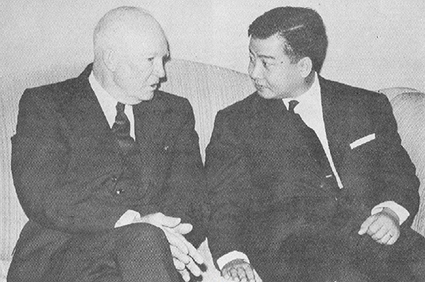NEWSLETTER
|
U.S. in Southeast Asia, And Lessons for Today
Eisenhower and Cambodia: Diplomacy, Covert Action, and the Origins of the Second Indochinese War adds to the author’s comprehensive study of America’s immersion in the affairs of that region explored in two earlier books: Before the Quagmire: American Intervention in Laos, 1954-1961, published in 2012, and So Much to Lose: John Kennedy and American Policy in Laos, published in 2014. All the books are issued by the University Press of Kentucky.
A review of the three books for the History News Network draws lessons from them for current American foreign policy, particularly “the disturbing tendency to disregard regional history and culture in favor of larger ideological constructs such as the Cold War or the global war on terror….
“The current quagmire in which the United States finds itself in the Middle East and Afghanistan,” writes the reviewer, Ron Briley, “encourages one to draw unfortunate parallels with the American experience in Indochina, leading to the conclusion that it is far easier to make diplomatic and military commitments than it is to withdraw from an ill-conceived intervention.”
The review praises Rust’s adherence to the “historian’s craft” that led him to credible analysis and conclusions through a “careful reading of primary documents and diplomatic communications available in the National Archives, Library of Congress, and Presidential libraries”.
Rust’s primary argument, notes the review, “is that both Eisenhower and Kennedy based their Southeast Asia policies upon ‘the cold war stereotype of a monolithic conspiracy, efficiently directed by Moscow and obediently executed by its wholly owned subsidiaries in Beijing and Hanoi’”.
Eisenhower and Cambodia focuses on U.S. policy toward Cambodia and its “mercurial leader”, Prince Norodom Sihanouk, who, the review states, “was able to take advantage of the First Indochinese War to gain independence from France”. But the prince then “drew the ire of the Eisenhower administration by pursuing a policy of neutrality amid the ideological conflict of the Cold War”.
Believing the prince was “secretly a communist”, America pursued a policy of regime change in Cambodia, including “employment of the Central Intelligence Agency (CIA) and covert operations”, focusing on support for opposition groups.
Primary among these efforts was an unsuccessful military coup led by Dap Chhuon, a misguided adventure that is the focal point of a review of the book in the Cambodian newspaper The Phnom Penh Post, which says the affair “reeked of foreign subterfuge”.
The newspaper quotes Rust that the United States was considering “getting rid of Sihanouk” from as early as 1956, and that his book has “produced the most compelling case to date that the U.S. colluded in the 1959 conspiracy”.
The review cites praise from several historians in support of Rust’s work, including that he “has done the most thorough research on the topic to date” and that “he certainly removes any lingering doubts that too often the United States considered Sihanouk fair game in its pursuit of victory in Vietnam.”
That decades-long “pursuit” is recounted in detail in a review of the Eisenhower book in The Cambodia Daily, which emphasizes Rust’s “zeal…born of a ‘desire to understand and analyze the thinking that seemed reasonable in the 1950s and early 1960s…and that seems catastrophic today’”.
Nor is Rust convinced, it concludes, that the United States “gleaned foreign policy savvy during the era”, citing the remarks of General Stanley McChrystal, former commander of American forces in Afghanistan, made ten years after the invasion began in 2001, that “We didn’t know enough and we still don’t know enough. Most of us, me included, had a very superficial understanding of the situation and history, and we had a frighteningly simplistic view of recent history, the last 50 years.”
Rust, who has had a long career as a writer and editor, was director of the Office of Communications at the Foundation from 1985 to 1991.
|


